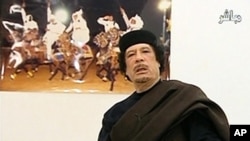With the International Criminal Court's arrest warrants for Libyan leader Moammar Gadhafi, his son and a trusted ally, some analysts say avenues could close for Mr. Gadhafi, should he want to leave Libya in defeat and find a safe haven.
The streets of rebel-held Misrata erupted in jubilation when news came Monday that the International Criminal Court had issued an arrest warrant for embattled Libyan leader Moammar Gadhafi.
Tuesday, the ICC’s top prosecutor, Luis Moreno-Ocampo, called on Mr. Gadhafi’s top aides to hand him over.
“Today, it is time for arrest," Moreno-Ocampo said.
But those close to the Libyan leader reject the court’s authority. “This court is nothing but a cover for the military operations of NATO, NATO which tried and declared it would assassinate the brother leader and his family. These actions from NATO are crimes against humanity,” said Mohammed al-Gamudi, Libya's justice minister.
He went on to say that Libya might look for ways to prosecute NATO for crimes against humanity. For more than 100 days, NATO air strikes have targeted Libyan government targets.
Libya is not a signatory to the International Criminal Court, but nations that could offer Mr. Gadhafi safe haven are. And that complicates matters, says Brett Schaefer, a legal analyst for the Heritage Foundation in Washington.
“What we do know is that numerous governments had approached Gadhafi about an exile and there were significant rumors that he was entertaining these options until the referral itself,” Schaefer said.
The referral came from the United Nations Security Council. That body requested that the ICC launch an investigation into Mr. Gadhafi and his aides. But once that referral is made, the court can act independently. In short, there’s no going back.
International pressure can be intense on countries that accept exiled leaders with arrest warrants outstanding.
Former Liberian President Charles Taylor fled to Nigeria when the Special Court for Sierre Leone, also at The Hague, issued a warrant for his arrest on war crimes charges. And the Nigerians eventually turned him over. Mr. Gadhafi has said this example meant leaders weren’t likely to accept exile deals in the future.
Schaefer says he would like to see Libyans deal justice for Mr. Gadhafi. “In an ideal world what you would have is the rebel forces be victorious, arrest Gadhafi and his associates and then hold them accountable domestically,” Schaefer said.
Mr. Gadhafi has said many times publicly that he will stay and fight to the death in his homeland. With an arrest warrant now marking him a wanted man, he may not have a choice.
Analysts: Warrant for Gadhafi Could Complicate His Possible Departure




